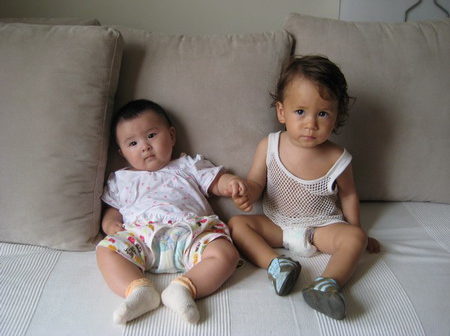Every summer my sister treks halfway around the world from her home in Oslo, Norway to Beijing to visit my mother and me. This annual tradition the last six years, has been an especially important one since our father passed away in early 2002.
These past two times have been particularly special to my family because both my sister and I have both had kids within the past year and a half. My nephew Emil-Alexander was born in the early spring of 2007, and I was lucky enough to see him twice last year: the first time in Norway last July, and just a few weeks later when my sister came here to Beijing to visit.
My half-Norwegian-half-Chinese-American nephew is, as you’d imagine, adorable. Though he was born a few weeks premature, he has grown into a feisty, friendly and inquisitive little toddler – especially here in Beijing, where both and he and his mother have been staying with Lao Lao (姥姥, grandma) over the past two weeks.
Emil seems particularly well-adapted to being in Beijing: His grandmother reports that in the past week alone he’s learned to suck through a straw, stroke our family cat (or rather, pull her tail), make friends with other babies and toddlers in my mother’s complex, and perhaps most interestingly, grab his new little sandals whenever she says “wo men chu qu wan’r ba!” (“我们出去玩吧!” “Let’s go out and play!) in Chinese.
Before he arrived, Emil had mostly been exposed to a mixture of Norwegian and English and had only just learned to say “Mama,” “Papa” and make a pronounced “hmmmph!” sound to let his mom know he’s hungry. He had been exposed to spoken Chinese before, but only for the short periods he had spent with his Lao Lao. But it’s been particularly amazing to us this time to see that in just two weeks, he’s already demonstrated awareness and even an understanding of spoken Chinese. Aside from knowing the phrase for going out to play, he also seems to know exactly what we are saying when we ask him if he’s hungry, or when we give him instructions (i.e. “stroke the cat – don’t pull her tail!”).
Of course most of this perceived understanding can be attributed to his sensitivity to our tone and gestures, but it’s still amazing how quickly he’s been able to absorb the context of the words (for one, he’s definitely learned the phrase “wo men chu qu wan’r ba!”). Despite my ignorance of the subject in general, this to me still seems to confirm my own crude understanding of linguistic theory and how babies and toddlers actually learn to talk through repetition, imitation and experimentation of the “sounds that cohere within words.” It’s all pretty fascinating and deep, and what’s most amazing is how seamlessly and naturally this process occurs right “under our noses.”
I can’t help but wonder, however, how much of the Chinese Emil learns this time around will be retained. What happens after he goes back to Oslo and starts daycare, where he will no doubt be fully immersed in a Norwegian environment? It will indeed be tough for my sister to continue speaking to him in her own not-quite-fluent Chinese over there.
I suspect that he may turn out like a good friend of mine – a Swede who was born in Beijing and left at the age of five. He spent the rest of his childhood in Hong Kong and Sweden (where he learned to speak both his mother tongue and English fluently) until returning to Beijing at the age of twenty and somehow “re-learned” spoken Chinese (without ever taking a formal lesson) to the point of virtual fluency as well. It seems that somewhere inside his brain the Chinese he learned from his ayi as a toddler in Beijing never left.
Hopefully we’ll be able to see Emil on an annual basis as he grows up. Even more, we hope he can somehow manage to learn Chinese in the process – perhaps through his visits with us each year (though I doubt the time will be sufficient). Questions, as well, loom in my mind about my own daughter and her ability to learn English – as my wife and I are accustomed to speaking Chinese at home, and it’s always seemed quite strange speaking English around the house (which was the case in our family when I was growing up in the U.S.).
I’ll leave how we address all that to another day and another post.




